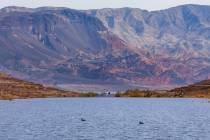Yucca passage dealt setback
WASHINGTON -- Energy Department hopes to transport nuclear waste to Yucca Mountain down a western Nevada corridor were dealt a possibly fatal blow on Tuesday when the Walker River Paiute Tribe withdrew its cooperation on a railroad route through its reservation.
The tribal council passed a resolution removing the tribe from a federal environmental impact study that included a rail segment for shipments of spent nuclear fuel along the outskirts of its sovereign lands north of Walker Lake.
The Walker River Paiutes faced growing pressures from their membership and from neighboring communities that were becoming increasingly vocal against the possibility of nuclear waste traveling through Northern Nevada.
"After considering the information we had gathered to date and discussions with our membership, the tribal council made the decision not to continue with the Department of Energy's process," tribal Chairwoman Genia Williams said in a statement.
"The tribe will not allow nuclear waste to be transported on rail through our reservation," Williams said.
Energy Department officials have considered a Northern Nevada route, known as the Mina corridor, as a promising path to the nuclear waste repository they want to build at Yucca Mountain, 100 miles northwest of Las Vegas.
Allen Benson, a Department of Energy spokesman for the Office of Repository Development in Las Vegas, said the tribe's decision means the Mina corridor will be nixed from the department's choices of potential rail lines to Yucca Mountain.
"Selecting Mina would appear to be academic at this time," Benson said late Tuesday. He said DOE will continue to include the Mina route in the impact statement expected to be released in October.
Elimination of the Mina corridor "certainly simplifies DOE's options," said David Blee, executive director of the U.S. Transport Council, a coalition of nuclear waste shippers.
It appeared that DOE's attention will be refocused on a 319-mile rail corridor to Yucca that originates at Caliente in Eastern Nevada.
To many analysts, the east-west Caliente corridor figures to be more expensive and more challenging from an engineering and construction standpoint than the 209-mile north-south Mina route that would run along old mining town rail beds at spots.
Under the Mina proposal, a base route would cross Northern Nevada on a Union Pacific rail, turn south at Winnemucca, pass east of Fernley, through the growing communities of Silver Springs and Wabuska, through the Walker River reservation and to Hawthorne.
Rail improvements and construction would proceed to Mina and near or through Tonopah and Goldfield, and south to the repository site near Amargosa Valley.
But Nevada officials who have fought against the Yucca repository stressed that nuclear waste from California likely would travel through Reno and Sparks, which sparked growing opposition locally.
Bob Loux, executive director of Nevada's Nuclear Projects Agency and a chief critic of the planned repository, said he was "actually pretty pleased" with the tribe's announcement.
"I know the Northern Nevada communities are relieved with the decision as well," Loux said in a telephone interview.
"This essentially would cut off use of the whole Mina corridor. I guess they're back to Caliente," Loux said.
Despite nuclear industry groups trying to persuade the tribe to participate in federal studies of the Mina corridor, Loux said the tribe probably "came to the conclusion there is no mileage with DOE, and nuclear waste transportation isn't as safe as everybody thinks."
Loux estimated the Energy Department spent hundreds of thousands of dollars in its effort to consider the Mina corridor as an option, including money spent on meetings, surveying and soil sampling.
The Walker River Paiutes for years had refused to allow the Energy Department to study a rail route through their reservation.
But the tribe reconsidered its position a year ago. It began cooperating in DOE environmental studies that included relocating a portion of rail track away from the tribal community of Schurz.
Moving the rail line was a Paiute goal as a way to redirect U.S. Army shipments of high explosives headed to the Hawthorne Army Ammunition Depot.
Tribal chairman Williams said the Walker River Paiutes grew increasingly uncomfortable.
"The big factor was input from tribal members," she said. "There has been a lot of opposition and not a lot of education in the Northern Nevada area. It was an issue that none of our tribal members were comfortable with. That was the biggest factor."
At the same time, the tribe in a statement said it has been approached by unidentified "business entities" with possible economic development ideas as alternatives to nuclear waste transport.
Williams declined to offer details of any proposals. She said tribal leaders plan to work with Sen. Harry Reid, D-Nev., to investigate its options.
Reid applauded the tribe's decision.
"I am so pleased that the Walker River Paiute Tribe has made the decision not to allow nuclear waste to be transported through their Reservation," he said in a statement.
"There are better ways to strengthen the economy in Nevada's rural and tribal communities, like investing in renewable energy sources, which alone could create more than 3,300 Nevada jobs," he said.
"The Tribe's decision is yet another blow to this (Yucca) project, which is on its last legs."
More aboutYucca Mountain























